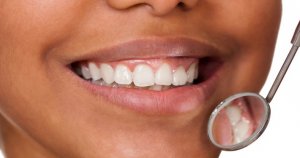Gum contouring is typically a cosmetic dentistry procedure used to reshape the gum line or reduce the look of a gummy smile. But in some cases, it can also be used in the treatment of problems like gum recession.
It’s not a very invasive procedure, especially when done using advanced techniques with pinholes or lasers.
In this article we’ll answer the following questions:
- What is gum contouring?
- How much does it cost?
- Is it medically necessary?
- Does it hurt?
- …and more!
If you’re already set on getting this procedure and you’d like to find a gum contouring dentist near you, you can call 866-383-0748 to talk to a dentist in your area.
Otherwise, keep reading to find out if this procedure is right for you.
What is gum contouring?
Gum contouring is a procedure that reshapes, reduces, or expands your gums or gumline. It can be performed surgically, or with lasers. Gum contouring is typically cosmetic.
Candidates for gum contouring surgery include people who have an uneven gum line, people whose gums cover too much of their teeth, or people with gum disease who need their gumline restored.


Though often cosmetic and used to improve the look of the gums, there are some cases, like when a patient has receding gums from gum disease, when a dentist may recommend gum surgery for medical reasons.
This procedure is just one of the various types of gum surgery you can get, so it’s important to keep them straight. It may be that another type of gum surgery is a better fit for your needs.
- Cosmetic gum contouring: This type of gum surgery is the main focus of this article. It’s typically a cosmetic procedure performed when a patient doesn’t like the look of their gums. It may involve trimming excess gum tissue, or reshaping the gums to create a more aesthetic gumline. In some cases gum contouring is recommended by dentists for patients with gum disease to increase gums where they are receding.
- Crown lengthening: This is actually a surgery that doesn’t so much affect the gums, although the gumline may need to be adjusted in the process. Crown lengthening may be needed in patients who need a crown, but don’t have enough tooth surface to which to attach the crown.
- Frenectomy: A frenectomy is performed to remove the frenom — a piece of tissue connecting the lips with the gums. This is also often done as a cosmetic procedure, but sometimes, problems with the frenom can cause issues with speech as well, which is called a tongue tie. You can read our full guide to tongue ties to find out more.
- Exposing impacted teeth: Sometimes a tooth will be trapped under a layer of gum tissue. In this case, gum surgery or contouring may be necessary to lift the flap of gum covering the tooth, so that it can be exposed.
- Laser gum surgery: Laser gum surgery can be performed for both cosmetic and medical reasons. It’s minimally invasive and can be used to remove unhealthy gum tissue and decrease gum pockets. Learn more about laser gum surgery in our article here.
- Pocket reduction: Pocket reduction is a type of gum surgery that may need to be done for medical reasons. It is also known as gum flap surgery and is typically performed on patients who have severe gum disease that can’t be fixed by scaling or root planing procedures.
Gum contouring procedure
There are various ways that gum contouring can be performed, so let’s take a quick look now.
Different methods for contouring gums


Laser surgery
In laser gum contouring, diode lasers make precise cuts in the gum line, taking away excess gum tissue. With laser surgery, there is less bleeding and less risk of infection. Patients heal faster after laser surgery and swelling and discomfort are minor.
Chao pinhole surgical technique
This procedure doesn’t require scalpels or sutures, making it a much less invasive way to recontour or restructure gums. It involves making a tiny hole in the gum tissue using a needle.
Then, the surgeon loosens healthy gum tissue and moves it to where it is needed, typically to help cover part of a tooth with receding gums. While generally used in procedures for gum disease treatment, it can also yield notable cosmetic improvements.
Radiosurgery
Radiosurgery yields immediate results when it comes to fixing gummy smiles and removing excess gum tissue. It uses a pressureless incision, with no scalpels, so that the tissue is removed and the patient immediately has their new smile.
Radiosurgery may also be used along with the placement of porcelain veneers, to contour the gums before the veneers are placed.
The process of reshaping your gums – whether it be for cosmetic or health reasons – is a relatively quick procedure. It can usually be completed in one to two hours during a routine office visit.
Your cosmetic dentist or periodontist will explain what you can expect before the procedure begins. They may use a pen to sketch out the desired new gum line to give you an idea of what the final results will look like. Once the surgery begins, the exact time it takes to complete could vary slightly depending on whether your dentist is using a scalpel, lasers or radiosurgery.
Once the procedure is completed, the tissue should heal fairly quickly and with minimal discomfort, again, with some slight variations depending on how the surgery was conducted.
Sonya Alvarado, DDS, Full Smile Dental
Surgery with scalpel
In some cases, you might get gum contouring done with the traditional scalpel method. The surgeon will use a scalpel to trim your gums. Afterward, sutures will be placed to close up the incision site, and the gums will need some time to heal.
This is a more invasive method and is largely being set aside in favor of laser surgery and other less invasive methods.
Gum contouring pain
The amount of pain a patient experiences will largely depend on the method used to perform gum contouring. But in general, you will get local anesthesia before the procedure. This will help you not feel any pain during the surgery.


After the procedure, it’s normal to experience some discomfort. The amount of discomfort you experience will not just depend on the method of surgery used, but also on how much of your gums are operated on.
After surgery, you may also be prescribed a painkiller or be instructed to take over-the-counter meds.
Gum contouring recovery
During recovery from a gum contouring procedure, you might be instructed to take a few days to rest, or at least perform only light activity. This will depend on the method used, although in general, even with a traditional procedure using a scalpel, gum contouring doesn’t require much downtime.
You will also probably experience some sensitivity in your gums in the days after the procedure, so you may need to stick to softer foods like soup, applesauce, or smoothies.
The most important thing to do during your recovery from gum contouring is to follow the instructions that your doctor gives you. You’ll also probably have an appointment to follow up with the procedure in a few days so they can make sure that there aren’t any infections and that recovery is going smoothly.
In some cases, your doctor may prescribe an antibiotic rinse to limit the chance of infections.
Is gum contouring necessary?
Gum contouring is a procedure that is most often performed for cosmetic reasons — people may feel that they have too much gum, or they don’t like the contours of their gum line.
However, there are some cases when it may also be considered a medically necessary procedure. The most likely case is if you have periodontal disease and more conservative solutions, like antibiotics or deep dental cleanings, haven’t worked.
Your dentist may then recommend surgery to reduce gum pockets, or a treatment to regrow gum tissue. These procedures may involve gum contouring, and in this case, it would be considered medically necessary, and part of it could be covered by medical insurance.
Gum contouring cost
Because most of the time gum surgery is a cosmetic procedure and therefore not covered by insurance, you’ll have to pay for it out of pocket. Costs for gum contouring can range from as little as $50 to $350 for a single tooth, and from $1,000 to $3,000 for all of your front teeth.
Risks of gum reduction surgery
As with any surgical procedure, there are some risks in gum contouring, but these are very few and far between. That being said, risks include:
- Bacterial infections
- Allergic reactions to anesthesia
- Gum tissue relapse
By following your doctor’s instructions and letting them know of any allergies you have, the chances of complications during or after your procedure are minimal.
What causes uneven gums?
If you’re reading this article, it’s likely you have an uneven gum line. This may be caused by genetics, taking certain medications, or health problems, like gum recession.
If you have gum recession, you may be suffering from periodontal disease and it’s essential that you visit your dentist, whether or not you like the look of your gums.
Is gum contouring worth it?
If you need gum contouring as a part of gum recession treatment, or to reshape damaged gums, and it’s the procedure that your dentist recommends, then chances are, it’s worth it.
If you want to get your gums contoured for purely aesthetic reasons, then you’ll need to decide for yourself if the cost is worth it to you. For better or for worse, an aesthetically pleasing smile may help some people raise their self-esteem.
Just remember that it’s far more important to have a healthy mouth than an attractive one — although these do sometimes go hand in hand.
Gum contouring review
In the video below, you can watch one patient’s journey through the process of getting a gum contouring procedure done. She shows before and after gum contouring pics, talks about her concerns and walks us through her recovery process.
If you’re considering getting this procedure done, watch her full video so you know what to expect.
Conclusion
Gum contouring is a procedure used to reshape the gum line, fix a gummy smile, remove excess gum tissue, or even add gum tissue when needed.
It can be performed using traditional surgical methods, or more advanced, less invasive methods using lasers or pinhole techniques.
Recovery from gum contouring surgery is fast and relatively painless, although you may need to watch what you eat for a few days if you are experiencing sensitivity.
If you want to find a dentist or oral surgeon who performs gum contouring near you, you can call 866-383-0748 and be connected to one now.
FAQs
How much does laser gum treatment cost?
For gum contouring, prices can range from $50 to $350 for a single tooth, or from $1,000 to $3,000 for all of your front teeth. Prices may vary depending on the method used.
Does gum contouring hurt?
Gum contouring shouldn’t hurt very much, if at all. You will receive local anesthesia before your procedure, and after the procedure, you can take painkillers to ease discomfort.
NCBI: Gummy Smile Correction with Diode Laser: Two Case Reports. Consulted 16th February 2022.
NCBI: Gummy Smile Correction with Diode Laser: Two Case Reports. Consulted 16th February 2022.




